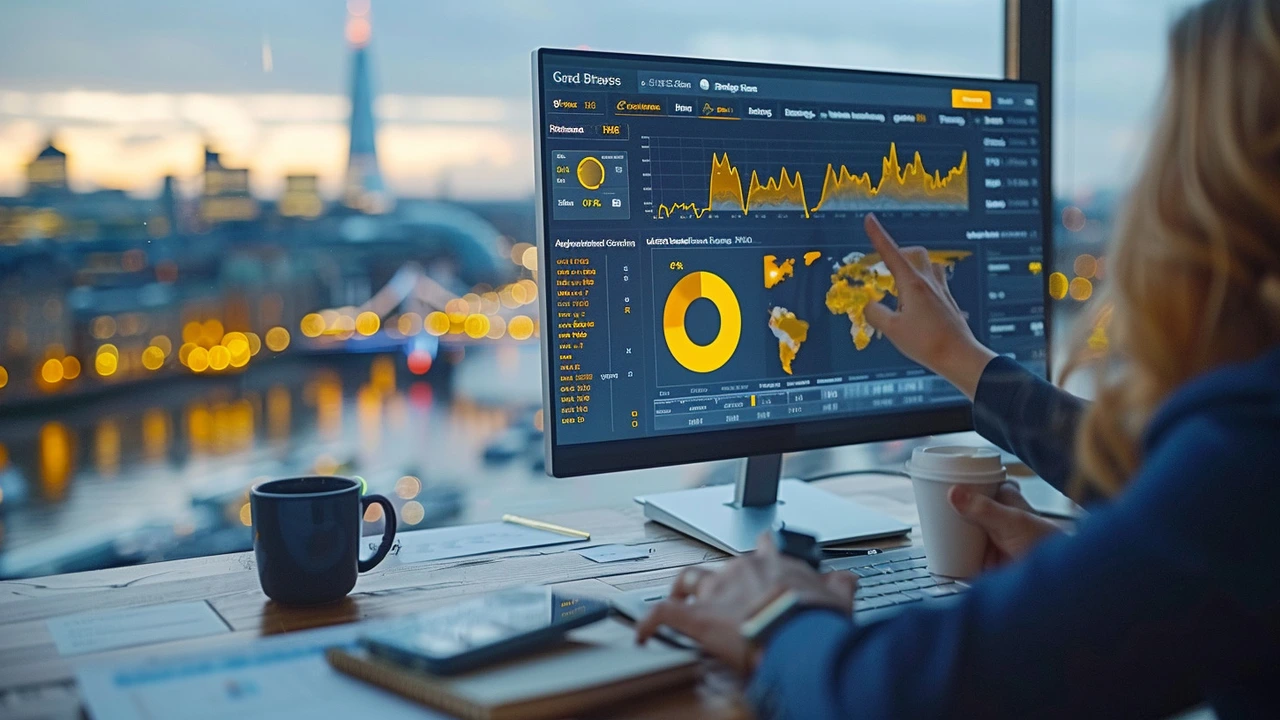Harnessing AI for Boosted SEO Strategies

As we navigate the digital age, integrating AI into your SEO strategy is becoming not just an option, but a necessity. The landscape of search engine optimization is ever-evolving, and staying ahead requires innovation and adaptability. This article explores how AI can significantly improve your SEO tactics.
From pinpointing the perfect keywords to creating engaging content, AI offers a plethora of tools that can optimize your digital marketing efforts. Imagine a world where your content is not only perfectly tailored for your audience but also ahead of your competitors.
In the following sections, we'll dive into how AI can streamline your SEO processes, enhance your content creation, and provide deep insights into user behavior. Ready to transform your SEO strategy? Let's get started!
- Introduction to AI in SEO
- Keyword Optimization Using AI
- Content Creation and Enhancement
- Competitor Analysis
- User Behavior and Experience
- Future Trends in AI and SEO
Introduction to AI in SEO
Artificial Intelligence, often known as AI, has been a game-changer in various fields, and search engine optimization (SEO) is no exception. SEO, a crucial aspect of digital marketing, relies heavily on understanding search engine algorithms and user behavior. AI steps in to simplify this process and make it much more efficient.
AI can analyze vast amounts of data quickly, recognizing patterns and trends that might be missed by human eyes. This capability is especially useful in SEO, where everything from keyword optimization to content creation can benefit from AI insights. For example, AI tools can parse search data from millions of users and identify which keywords are gaining traction, allowing marketers to adjust their strategies in real-time.
One area where AI shines is in content creation. Traditional content strategies often involve a lot of guesswork and manual labor. AI, however, can generate topic ideas, suggest headlines, and even write entire articles that are SEO-optimized. A study by HubSpot showed that businesses using AI for content creation saw a 50% increase in organic traffic within six months.
Another impressive feature of AI in SEO is its ability to perform competitor analysis. By scanning competitors' content, backlinks, and social media activities, AI tools can provide deep insights into what is working for others and what isn't. This information is invaluable for adjusting your own strategy and staying ahead of the curve.
Understanding user behavior is another critical component. AI can track how users interact with a website, identifying which pages keep them engaged and which ones drive them away. This data helps in optimizing the user experience, making the site more attractive and engaging for visitors.
"AI is like a lighthouse in the fog of data. It helps marketers navigate through the overwhelming amount of information to find what truly matters." - Neil Patel
The integration of AI into SEO is not just about making current practices more efficient; it's also about pioneering new methods. Machine learning algorithms, for example, can predict future trends, letting you stay ahead in the ever-competitive digital landscape.
In summary, the introduction of AI into SEO is transforming the way businesses approach digital marketing. It facilitates smarter keyword optimization, more engaging content creation, meticulous competitor analysis, and improved user experience. As AI continues to evolve, its influence on SEO will only grow, making it an indispensable tool for marketers.
Keyword Optimization Using AI
One of the essential components of a solid SEO strategy is keyword optimization, and AI tools have revolutionized this aspect. Traditional methods of keyword research involved a lot of manual effort. You had to analyze search volumes, competition, and relevance. Now, with AI, this process has become much more streamlined and accurate.
AI-powered tools can analyze vast amounts of data in real time. This means they can detect trends and shifts in keyword popularity long before they become apparent through manual analysis. By utilizing machine learning algorithms, AI can predict which keywords are likely to become popular, giving your content a head start in the ranking game.
"The ability of AI to process and analyze billions of data points gives marketers a competitive edge. It’s not just about using keywords, but utilizing the right keywords at the right time," says Rand Fishkin, a renowned SEO expert.
Take, for example, Google's BERT update. This AI-based algorithm change focuses on understanding the context of words in a search query, rather than just the words themselves. With this shift, AI tools can help you identify long-tail keywords that match user intent more accurately. This means your content can rank higher because it’s more aligned with what users are actually searching for.
Another exciting development is the use of Natural Language Processing (NLP) in keyword optimization. NLP helps in understanding the semantics behind user queries. This goes beyond basic keyword matching and looks at the overall context and meaning. AI-driven NLP tools can suggest keywords and phrases that are contextually relevant, even if they don’t contain the exact terms initially considered. This opens up new opportunities for content creation and optimization.
It's also important to mention the role of AI in competitive analysis. AI tools can monitor your competitors' keyword strategies in real time. They can identify which keywords your competitors are ranking for and suggest gaps in their strategy that you can exploit. This continuous monitoring helps you stay ahead in a dynamic marketplace.
If you're looking at practical tools, platforms like SEMrush, Ahrefs, and Moz now incorporate AI capabilities. These tools offer features like predictive keyword analysis, suggesting keywords based on current trends and historical data. This proactive approach helps you to not only optimize for present trends but also prepare for future shifts.
Here's a simple guide to get started with AI-powered keyword optimization:
- Use AI tools to generate a list of potential keywords.
- Analyze the keywords for search volume, competition, and relevance.
- Utilize NLP features to find contextually relevant keywords.
- Monitor competitors and identify keyword gaps.
- Continuously update and refine your keyword list based on AI-driven insights.
Data can also speak volumes. According to a study by BrightEdge, over 60% of marketers say SEO and organic traffic generate the highest quality leads. This statistic underscores the importance of a well-optimized keyword strategy. By leveraging AI, the process becomes not only more efficient but also more effective, ensuring you capture the right audience at the right time.
In summary, keyword optimization using AI is a powerful way to enhance your SEO strategy. It provides more accurate, timely, and actionable insights that traditional methods simply can’t match. Embrace these AI tools and watch your website’s search performance soar.

Content Creation and Enhancement
Content is king in the digital world, and AI is revolutionizing how we create and enhance it. One of the major ways AI is impacting content creation is through natural language processing (NLP). NLP helps in understanding the nuances of human language, allowing AI tools to generate content that reads as if it were written by a human. For instance, AI can now analyze top-performing articles in your niche and suggest topics that are likely to resonate with your audience.
One outstanding example is the AI tool Jarvis, which can write blog posts, social media content, and even novel chapters. By inputting a few keywords or phrases, Jarvis generates well-structured and coherent content. This means less time spent on brainstorming and more time focusing on strategy and engagement. A study by HubSpot showed that businesses using AI for content creation noticed a 20% increase in user engagement within six months.
AI can also enhance content by analyzing user engagement data to identify what kind of posts are working and which are not. Tools like SEMrush and Clearscope use AI to provide real-time feedback on your content. They assess readability, keyword density, and even suggest sections that need improvement. This ensures that your content is both engaging and optimized for search engines.
Moreover, AI can aid in personalization, making sure that the right content reaches the right user at the right time. Personalized content has been shown to be 57% more effective in achieving marketing goals than non-personalized content. This is where AI-driven tools like Adobe's Sensei come into play, analyzing user behavior to tailor content that meets individual preferences and improves user experience.
"AI can analyze countless data points in a fraction of the time it takes humans, making it an invaluable tool for content creators looking to optimize their work," says Nir Eyal, a well-known author and behavioral designer.
Video content is another area where AI shines. Tools like Pictory and Magisto use AI to edit videos, add captions, and even suggest the best clips to use. This can significantly reduce the time and effort required to create high-quality video content. According to a report by Wyzowl, 84% of people were convinced to buy a product or service after watching a brand’s video, emphasizing the importance of this medium.
Last but not least, AI helps in content distribution. By analyzing data, AI can recommend the best times to publish your content and the most effective channels to use. This not only maximizes reach but also ensures that your content makes the greatest impact. Data-driven insights provided by AI tools like MarketMuse can guide when and where to publish, helping to increase visibility and engagement.
Incorporating AI into your content creation and enhancement strategy is no longer optional—it's essential. The tools and technologies available today make it easier than ever to produce high-quality, engaging content that resonates with your audience and ranks well on search engines. Whether you're writing blogs, creating videos, or personalizing user experiences, AI has the potential to transform your content strategy from good to exceptional.
Competitor Analysis
Competitor analysis is like having a secret window into what makes successful websites tick. It's a crucial part of your SEO strategy and helps you identify the strengths and weaknesses of your rivals. By leveraging AI for this task, you can dissect your competitors' moves with precision and depth like never before. Imagine understanding not just what they've done right, but also spotting the opportunities they've missed.
AI can analyze large volumes of data quickly, identifying patterns and trends in your competitors' strategies. For example, AI tools can scan their keyword usage, the structure of their backlinks, and the performance of their content. This gives you actionable insights on what keywords are driving traffic to their sites and how you might replicate or outperform their success. AI can also help you spot gaps in their content that you can exploit by creating superior or more comprehensive material.
Another advantage of using AI in competitor analysis is it can help you understand user engagement metrics. Tools powered by AI can reveal how long visitors stay on your competitors' pages, what topics generate the most interest, and even how their user experience stacks up. This information is invaluable for tweaking your own website to better serve your audience and keep them engaged.
Quote from MarketingProfs emphasizes:
"AI-powered tools offer unparalleled insights into competitor strategies, allowing businesses to refine their SEO approaches with precision and confidence."Having access to detailed reports on what works well for rival sites can inform your content creation process, helping you to craft pieces that not only match but exceed industry standards.
Furthermore, AI can automate the process of monitoring your competitors, saving you time and effort. By setting up alerts and updates on changes in their SEO strategies, you can stay ahead of the curve without needing to manually track each move. This proactive approach ensures you're not just reacting to competitors but anticipating their next steps and planning your moves accordingly.
Consider a tool like SEMrush or Ahrefs, both powered by AI, that offers extensive competitor analysis features. These tools can provide you with data on keyword rankings, backlink profiles, and even paid search tactics. Using this information, you can develop a competitive strategy that leverages your strengths and exploits your competitors' weaknesses.
Integrating AI into your competitor analysis helps you not only understand the current competitive landscape but also anticipate future trends. This foresight can be a game-changer, giving you the advantage of being the first to capitalize on emerging opportunities.

User Behavior and Experience
Understanding user behavior is a cornerstone of a successful SEO strategy. When individuals visit your website, their actions—what they click on, how long they stay, what they share—can tell you a lot about what resonates with them. AI tools have elevated this understanding to new heights by providing deeper insights and finer details about online behavior. Not only do these tools track basic metrics, but they also analyze patterns and trends over time, allowing you to make informed decisions about your content and marketing strategies.
One remarkable feature of AI in understanding user behavior is its ability to predict what users are likely to do next. Predictive analytics use historical data to forecast future user actions. For instance, if a user frequently visits pages about vegan recipes, AI can suggest related content or products that match their interests. This personalization can significantly enhance user experience and keep visitors engaged longer on your site. Research by Epsilon indicates that 80% of consumers are more likely to make a purchase when brands offer personalized experiences. Therefore, leveraging AI to customize user interactions can directly impact your conversion rates.
Another critical element AI brings to the table is sentiment analysis. AI tools can analyze user-generated content, such as reviews and social media posts, to gauge public sentiment about your brand. By understanding how users feel about your products or services, you can address negative feedback promptly and reinforce positive experiences. This proactive approach not only improves your online reputation but also builds trust and loyalty among your audience. A quote by Mary Meeker, a partner at Bond Capital, captures this well:
"Companies that can harness user data and personalize the customer experience will be the winners in the digital age."This underscores the importance of listening to and learning from your audience.
AI also significantly enhances your ability to perform A/B testing efficiently. A/B testing involves creating two versions of a webpage to see which performs better in terms of user engagement and conversion. Traditionally, this process could be time-consuming and limited to a few variants. However, AI can quickly analyze multiple variables and iterations simultaneously, providing you with actionable insights in real-time. This rapid testing and optimization can save time, reduce costs, and help you hone in on the most effective strategies much faster.
To quantify user behavior effectively, AI employs sophisticated algorithms that track and analyze data points. These data points include click-through rates, bounce rates, and heatmaps showing where users’ eyes linger the most on your page. By examining these aspects, you can refine your website layout, content, and overall user experience. For example, if the bounce rate is high on a particular page, AI can help identify the underlying issue, such as poor load times or irrelevant content, and suggest changes to improve user engagement.
It’s important to note that while AI can provide invaluable insights into user behavior, the human touch remains crucial. AI can inform your strategy, but understanding your audience on an emotional level and tailoring your approach to meet their needs can make the real difference. Combining AI-driven data with empathetic marketing strategies can create a powerful synergy that drives user satisfaction and business growth. As technology continues to advance, the businesses that will thrive are those that can blend data-driven insights with genuine human connections.
Future Trends in AI and SEO
As technology advances, the synergy between AI and SEO continues to offer new and exciting possibilities. One of the most significant future trends is the increasing use of natural language processing (NLP). This technology allows search engines to understand and process human language more effectively, making your content more likely to be accurately indexed and ranked. By analyzing phrases and sentences rather than just keywords, NLP can help create more engaging and relevant content.
Another burgeoning trend is the use of reinforcement learning. This technique allows AI systems to learn and improve from their interactions. In the context of SEO, reinforcement learning can help in customizing search engine algorithms to better match user intent. Google’s RankBrain, for instance, uses such AI techniques to provide more accurate search results based on user engagement.
The integration of AI-driven voice search optimization cannot be overlooked. With the rise of smart speakers and virtual assistants, optimizing your content for voice search is becoming crucial. Data shows that 55% of households are expected to own smart speakers by 2025. This means that SEO strategies will need to adapt to the conversational queries typical of voice searches.
AI will have a transformative impact on the digital marketing landscape, offering unprecedented levels of efficiency and accuracy in understanding user intent. - Forbes
Predictive analytics is another exciting frontier. By analyzing past data, AI can provide insights into future trends, enabling you to proactively adjust your strategies. Predictive analytics can help in identifying which content topics will likely gain traction, which keywords to target, and even the best times to publish new content for maximum impact.
Automated content generation is also worth mentioning. AI tools are increasingly capable of creating high-quality content that can engage and inform readers. While human creativity and nuance are irreplaceable, these tools can be highly effective for generating large volumes of content quickly, allowing more time for strategy and creativity.
Lastly, AI-enhanced image and video optimization are expected to take center stage. Visual content is becoming more integral to SEO strategies, and tools that can optimize images and videos for search engines will be invaluable. This includes tagging, categorizing, and even understanding the content of visual media to improve ranking and relevance.
In summary, staying ahead in SEO will require embracing these AI-driven trends. As AI continues to evolve, so too will the tools and techniques at your disposal, enabling more precise and effective strategies for capturing and retaining audience attention.